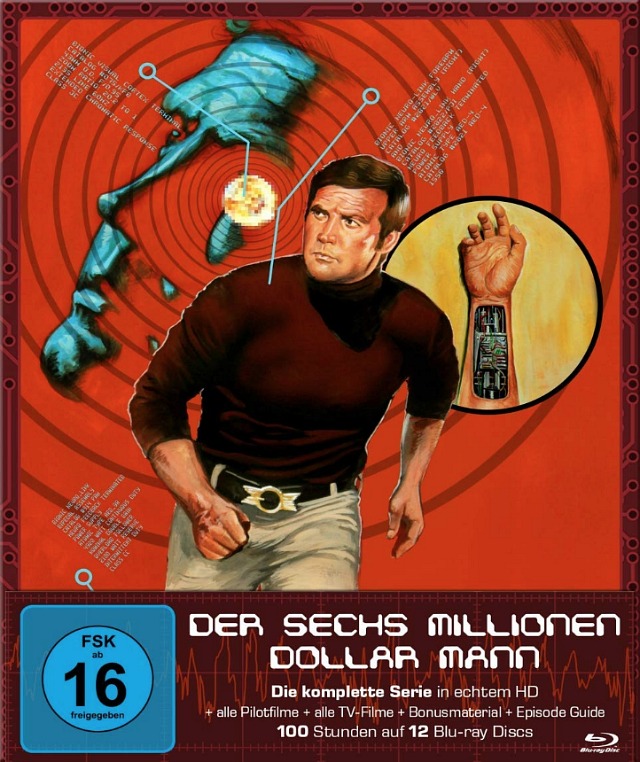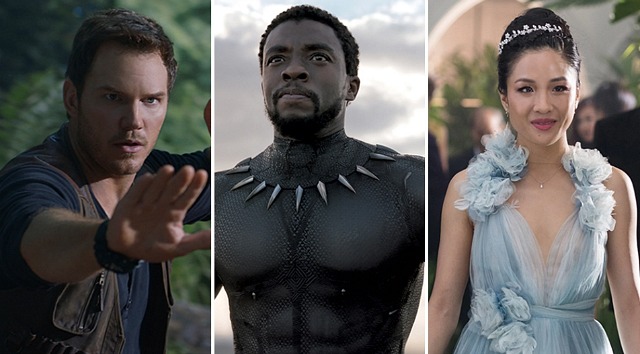Black Mirror: Bandersnatch (Netflix) “is definitely an experience worth playing around with, and easily the only time in movie history that an interactive storyline on this level hasn’t turned out to be a steaming pile of garbage.” — from review by The Gate‘s Andrew Parker. I felt good about this right away due to Fionn Whitehead (Dunkirk) having the lead role. Then I wimped out. Then I went on a hike last night. Then I filed today. I might see it tonight.
Who Saw “They Shall Not Grow Old”?
You’ve probably read that yesterday Peter Jackson’s They Shall Not Grow Old earned $3.1 million domestic at 1,122 theaters (i.e., Thursday). So who saw it and what’s the verdict? Here’s my 11.12 review.
The color-and-3D-enhanced World War I doc has now taken in $5.4 million in two days of showings in North America. It gathered $2.3 million on 12.17 — the largest single-day gross for a Fathom documentary in the U.S. Warner Bros. will launch a tri-city theatrical release (New York, Los Angeles, Washington, DC) on Jan. 11, and then expand to 25 markets on February 1st.
Reposting my review: Last night I watched Peter Jackson‘s They Shall Not Grow Old.
The enhanced-footage doc (colorized, digitally sharpened, converted to 3D) is about the arduous experience of British troops in the European trenches during World War I.
Roughly six million British troops were sent to fight in Europe between August of 1914 and September 1918. Just over 700,000, or 11.5% of the total, were reportedly killed. Then again the World War I Wiki page says 1,114,914 Brits died in the conflict — who knows?
It begins and ends with conventional black-and-white footage of young troops preparing for battle and then a closing section depicting the aftermath and return to the home front. Only the brutality of war section. which lasts a bit more than an hour, is shown in color and 3D. The opening black-and-white section lasts around 19 or 20 minutes, and then into the colorized carnage and then a wrap-up that last between 10 and 12 minutes, not counting closing credits. The film runs 99 minutes.
Cool Blustery Winds
Very few people hike around the flush, north-of-Sunset neighborhoods of Beverly Hills and Bel Air like Hollywood Elsewhere does.
Locals drive through and tourists roam around in minibuses, vans and hearses with some guy narrating, but you can’t “look” at these nabes through plastic viewing panels. You have to stand there on foot and take in the huge scale of some of the more ostentatious palazzos (Caesar Augustus would be gobsmacked if he could time-travel here) and just smell the grass lawns, the ivy-covered walls, and the towering pine, sycamore, cypress and jacaranda trees. And then you’ll come to a nice lookout spot and gaze upon the glittering flatlands and the hundreds of commercial buildings and high-rise condos winking like dull diamonds in the temporarily smog-free air. The temps were low-50ish and the winds were stiff and strong.
You can’t live in this area and not eventually say to yourself, “I’m here because I worked hard and am good with money and investments, but also because I’m better than the people living below me…I can’t say this on Twitter but it’s a little bit true.”
Last night’s trek began at the corner of Whittier and Lexington. North on Ladera Drive, right on Ridgedale, fast left on Bridle Lane, and then left on Angelo Drive. We stayed on winding, super-steep Angelo for a good mile and a half, being careful to dodge the speeding Porsches and Lamborghinis tear-assing around corners at 40 mph or so. (Asshats.) When we finally hit the very top of flush mountain — and I mean way, way up there — we took a right on Davies Drive, easing into a slight downhill grade. And then a super-sharp right on Cielo Drive, and then downhill to Benedict Canyon Drive.
We eventually passed under the former site of the Robert Byrd-designed, French farmhouse abode shared by Roman Polanski and Sharon Tate during the first eight months of 1969. The Manson murder house (10050 Cielo Drive) was torn down in the late ’90s. Jeff Franklin‘s grotesque Mediterranean-by-way-of-Uday Hussein-supermanse sits there now.

Recently fallen tree on Ladera Drive — Thursday, 12.27, 6:20 pm.

Dreamed I Saw St. Augustine
Taking my cue from Ernest Hemingway‘s “write hard and clear about what hurts,” I have an unpleasant confession to share. Sometime around 3:30 or 4 am (i.e., the hour of the wolf) I dreamt about waiting to die on death row. Draw your own conclusions but it happened. Everyone has nightmares from time to time, but nobody in my racket talks about stuff like this.
It was like a string of Twilight Zone mini-episodes. Two or three minutes and fade to black, and then the next one, etc. There was some debate by the death row honchos about what mode of execution to use — injection, firing squad, gas chamber a la Fred MacMurray in Double Indemnity, hanging, electric chair, guillotine or thrown to hungry wolves a la Ernest Borgnine in The Vikings. At one point I was led out to the MacMurray chamber with 20 minutes to go before they dropped the pellets, and then Sacramento approved a stay of execution.
The dream was so distressing that my left leg turned into concrete from the tension, and then succumbed to an agonizing charleyhorse. I leapt up and tried walking around to get the blood flowing, and then I used a heated vibrating muscle relaxer device that I bought a few years ago on Amazon. The death row + leg seizure double whammy was so traumatic that I decided to decompress on the living room couch by surfing Twitter and checking column typos. I crashed an hour or so later, exhausted. I awoke at 8:15 am Pacific.
I’m partly blaming the Sundance commissars along with everything else (A Star Is Born, James Wan and Aquaman worship and Jason Momoa‘s smug, shit-eating aqua-grin, the SJW twitter predators).
Life is demanding and draining and rarely relaxing, much less celebrative. The goal, of course, is to live as vividly and vibrantly and energetically as you can while you can. “We’re all gonna get there, no exceptions” — Terence Stamp in The Hit. But only a few of us can dance down staircases like Jimmy Cagney (okay, I haven’t done this over the last decade) and sing harmony on each and every Beatles song ever written and hike up super-steep 45 degree roads in the Hollywood hills (as I did last night with Tatyana), etc.
Bernie vs. Reality
In my book, the Berniebot attack on Beto O’Rourke a few days ago cancelled Bernie’s candidacy. I wore a Bernie sticker on my rumble-hog all through ’15 and ’16, but he’ll never get there in ’20. Nobody is going to get behind an 80 year-old who can’t seem to win over southern POCs. He’s just as dead as Hillary. I respect and admire everything he stands for, but…what am I saying? Of course he’s going to run. He can’t get there but he’ll give it hell anyway.

’70s TV Visual Values — Close-Ups, Overlighted, Banal
The Six-Million Dollar Man is an Austin Powers title. From Germany’s Turbine Medien, a 12-Bluray box set containing five seasons worth of episodes plus three extras. Those awful action sequences when slow-mo was used to convey Steve Austin moving at super speeds. Lee Majors, a slab of TV series beefcake in the ’70s and ’80s, is still with us at age 79. Look at the close-ups on the DVD Beaver review page — all 1.33:1, almost all close-ups, what TV series looked like in the bad old days of nascent cable and lingering coat-hanger antennas. Of all the things to blow 81 euros on…

Eyes Forward — Forget The Past
Tom Hanks and Marielle Heller‘s Mr. Rogers movie has acquired a new title — A Beautiful Day in the Neighborhood.
Did you know that before today’s announcement the Rogers biopic was called You Are My Friend? Did you know that? A lot of us did, I think. But not Variety‘s Matt Donnelly, to go by his report about the new title. Donnelly and his editors would prefer that readers forget the old title. In their view, the Hanks-Rogers-Heller project was a “previously untitled movie.”
Tristar will release A Beautiful Day in the Neighborhood on 10.18.19. Award-season play for Best Picture, Director, Actor, Screenplay (Micah Fitzerman-Blue, Noah Harpster), etc.
She Lugs Hay Bales!
Buckshot by one-third of the critics during last September’s Toronto Film Festival, Max Minghella‘s Teen Spirit will open on 4.5.19 via Bleecker Street and LD Entertainment. It costars stars Elle Fanning, Rebecca Hall and Zlatko Burić.
The Hollywood Reporter‘s Leslie Felperin: “This making-of-a-star drama, set on the Isle of Wight, is old-fashioned and corny, and not in a good way. Flat and a bit pitchy.”
Variety‘s Owen Gleiberman: “Elle Fanning plays a British teen who enters a TV singing competition in a pop film that tries to give us a sugar high but is too cookie-cutter to soar.
“If Teen Spirit, however, wants to be a movie of the moment, the genre of indie fairy tale it belongs to is older to the point of being rather creaky. Scrape away the pop frosting and what’s underneath is basically one of those cookie-cutter Miramax ‘crowd-pleasers’ from the ’90s: a movie that’s formulaic in every detail but that passes off its particular cute brand of British Isles whimsy as a vaguely high-toned signifier of ‘authenticity.'”
Felperin quibble #1: “Fanning, reported to have done all her own singing live and not had it auto-tuned in post, has a good set of pipes, but it’s hard to see her competent but derivative musical stylings breaking out in a crowded marketplace.”
Realm of the Empty Popcorn Container
“The exhibition business” — i.e., cheap sugar-fizz highs delivering mass soul suffocation by way of increasingly tedious genre flicks and running-out-of-steam franchises — “came roaring back in 2018″…yes! Joy and rapture!
So proclaims a 12.26 Variety trend story by Brent Lang and Rebecca Rubin, titled “Movie Theaters Bounce Back: What’s Behind the 2018 Rebound.” Lang and Rubin’s feigned exuberance is about $11.5 billion worth of tickets having been sold over the last twelve months — a fact.
“After being written off in 2017 as creaky anachronisms that were being rapidly surpassed by more agile streaming players such as Netflix and Amazon, studios and theater owners are closing out the year in a much more optimistic frame of mind,” L & R declare.

Question: Why did moviegoers return to theaters in such great numbers over the last 12 months? Answer: If the right kind of gleaming, smart-assy, familiar-but-diverse, CG-fortified crap comes along, moviegoers will lap it up like seals. The key terms are “right kind.”
Poison choke quote: “It’s all about content,” said Jeff Goldstein, head of domestic distribution at Warner Bros. “There were movies audiences wanted to see.”
Uh-oh factor #1: “There are reasons to worry that the film business remains overly reliant on a handful of genres and franchises. Six of the top 10 highest-grossing domestic releases in 2018 were superhero pics and nine of the 10 most successful North American movies were sequels or spinoffs, hardly a triumph for originality. The only movie in the top 10 that wasn’t part of a pre-existing series was The Grinch, a venerable piece of intellectual property that has already inspired a Jim Carrey movie and a beloved television film with the voice of Boris Karloff.”
Uh-oh factor #2: “Some of these franchises are growing longer in the tooth. Many are now entering their second, third, or, in the case of Star Wars, their fourth decades.
Due Respect, But “A Star Is Born” Must Be Stopped
21 out of 30 Gold Derby spitballers have Bradley Cooper‘s A Star Is Born in their top position, and I think it’s time to bring out the big guns and the big buckets and say “hold on, wait a minute…don’t do this.” It’s time to beg all of those Academy members who care about the historical importance of the Oscars to pull back on the reins and go “whoa, nelly!” and ask themselves if they really want to give the Best Picture Oscar to a remake of a remake of a remake of a remake. Because that’s what they’re apparently on the verge of doing.
Now is the time for Academy and guild members to stop and take a hard look at things. The first half of Cooper’s film is very good, of course, and Cooper and Lady Gaga are better than pretty good, and even with the somewhat weaker second half (and you know ASIB has this problem, that it doesn’t deliver great cards and that the Bradley URINE TROUBLE, MISTER! downswirl scenes aren’t really believable, not in today’s reach-out realm)…yes, it’s still a better-than-decent film…and yes, Hollywood Elsewhere has been saying all along that it’s the best of the four versions of this age-old Hollywood saga (five if you count What Price Hollywood?).
But ask yourselves, “Is this who we are? Are we really going to give a Best Picture Oscar to the fifth version of a showbiz saga that dates back 85 years?”
Alternate lament: “Are we really going to give a Best Picture Oscar to a generally admirable, well-made film because it’s made $200 million? Wouldn’t that make us the People’s Choice Awards if we do that?”
Best Picture Oscar winners ought to be about the times from which they sprang — about whatever cares or currents or passions were stirring in the soup when they were written, made or released. Some kind of zeitgeist connection, some kind of “this is what life seemed to be like when we made this” element.
This representational belief system was shattered into pieces when Chicago won the Best Picture Oscar. Again with The Artist and The King’s Speech. Remember how terrible it felt the morning after these films won? Do you want to feel that feeling again?
I’m sorry but A Star Is Born must become a respected also-ran. If for no other reason than to rebuff that way-too-early, excessively smug prediction by Variety‘s Kris Tapley. Give the Best Picture Oscar to the obviously deserving Roma, to the socially transformative blockbuster Black Panther, to the perfectly finessed and emotionally affecting Green Book, to the witty and pointed The Favourite, to Can You Ever Forgive Me?…to anything but A Star Is Born.
Please, please, please think this over.
The Gold Derby gang knows nothing. They’re finger-to-the-wind cowards who are putting A Star is Born in their top position because it feels like an easy default — because they know no one anywhere will raise an eyebrow. The Gold Derby gang is all about going along with the current and avoiding taking a strong stand about anything.
Roma, Black Panther, Green Book, The Favourite…Roma, Black Panther, Green Book, The Favourite…Roma, Black Panther, Green Book, The Favourite. Choose one of these four and you’ll feel better about yourselves in the morning. Don’t tumble for A Star Is Born…please.

Foot Fix Was In
A 12.26 N.Y. Times story by Steve Eder doesn’t offer irrefutable proof that a Queens podiatrist got a 22 year-old Donald Trump got out of military service by writing a bogus letter to the draft board about Trump suffering from bone spurs, but it strongly suggests this.
The story is titled “Did a Queens Podiatrist Help Donald Trump Avoid Vietnam?”
“A possible explanation involves a foot doctor in Queens who rented his office from Mr. Trump’s father, Fred C. Trump, and a suggestion that the diagnosis was granted as a courtesy to the elder Mr. Trump.
“The podiatrist, Dr. Larry Braunstein, died in 2007. But his daughters say their father often told the story of coming to the aid of a young Mr. Trump during the Vietnam War as a favor to his father.
“’I know it was a favor,’ said one daughter, Dr. Elysa Braunstein, 56, who along with her sister, Sharon Kessel, 53, shared the family’s account for the first time publicly when contacted by The New York Times.
“Elysa Braunstein said the implication from her father was that Mr. Trump did not have a disqualifying foot ailment. ‘But did he examine him? I don’t know,’ she said.
Basic Vietnam-era realities for men of conscription age: Anybody who was able to weasel out of Vietnam service by any strategy, did so. Nobody thought twice about it. Volunteers like Oliver Stone aside, that war was mostly fought by blue-collar guys who didn’t have a scam or a strategy that would allow them to wiggle out. No late teen or 20something male with any kind of educated background wanted to fight in Vietnam. It was an evil war or at the very least a criminally misguided one. The full might of a superpower attempting to crush an agrarian nation — a peasant society just trying to rid itself of colonialists and imperialists — was appalling to anyone with a brain.
Young Donald Trump was just the fortunate son of a rich guy who got out through what sounds like fraudulent means, but everybody was trying to do the same thing.



